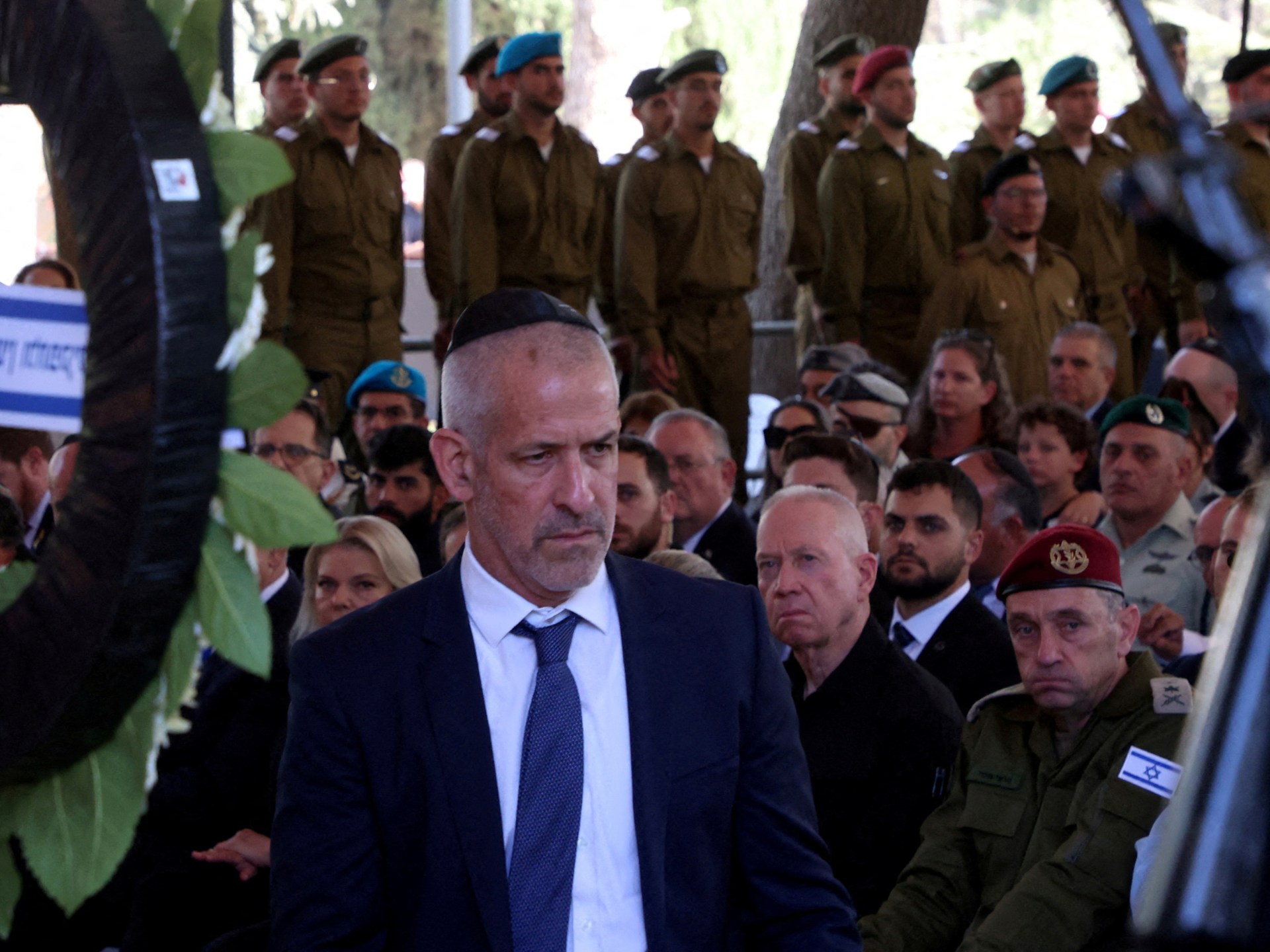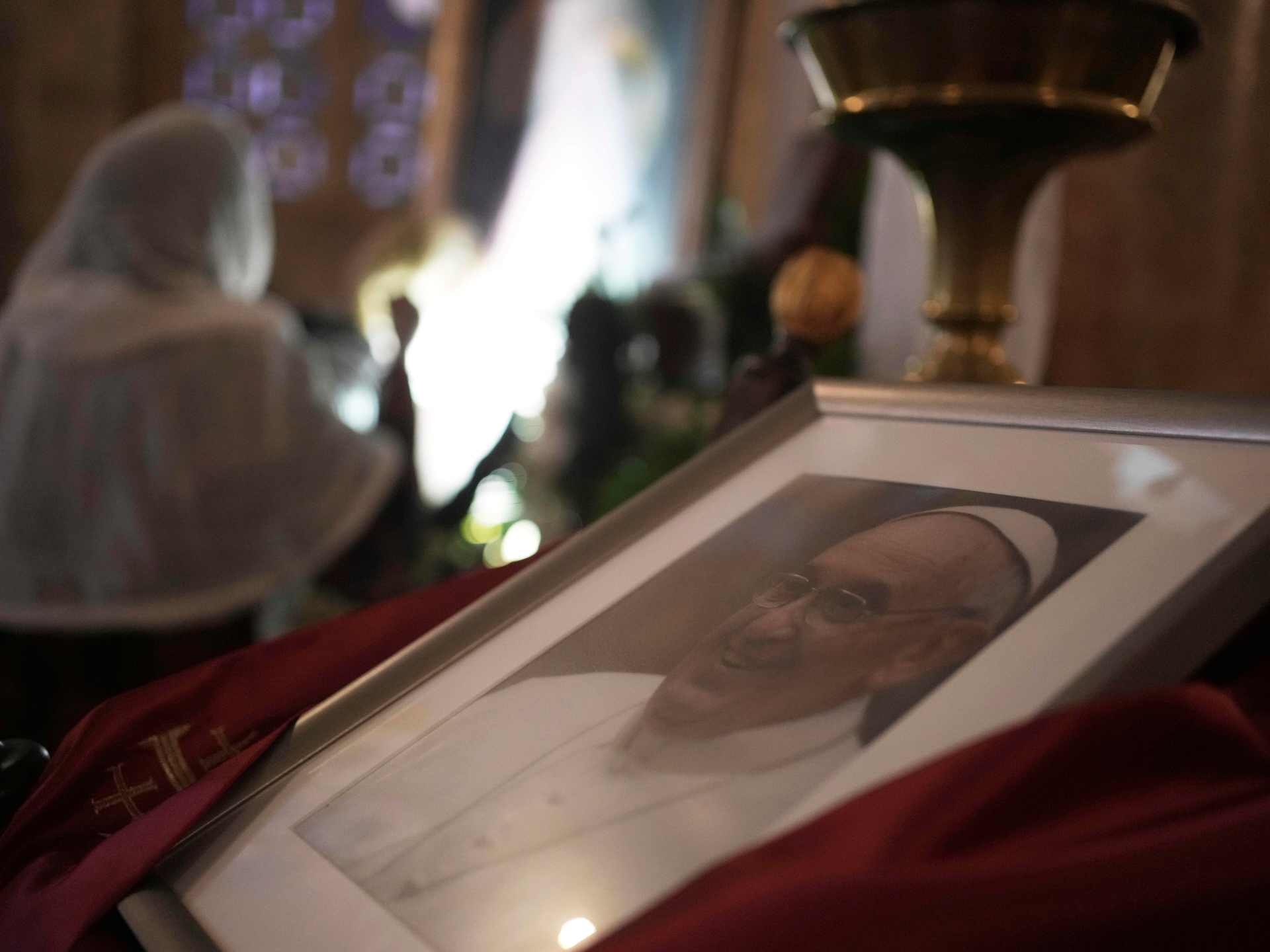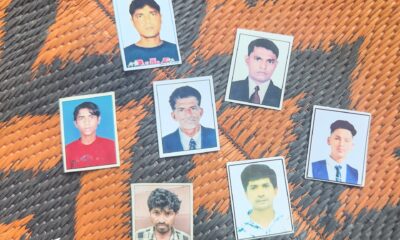Middle East
Israeli spy chief accuses Netanyahu of demanding illegal operations | Politics News

Ronen Bar fires latest salvo in ongoing showdown with Israeli PM that has divided country.
Israel’s spy chief has accused Prime Minister Benjamin Netanyahu of trying to fire him for his refusal to commit illegal acts aimed at protecting the leader’s personal and political interests.
Ronen Bar, chief of Shin Bet, Israel’s domestic intelligence service, made the assertion in an affidavit to the Supreme Court on Monday. Netanyahu’s move last month to dismiss Bar was suspended by the court pending an investigation, and the ensuing tussle has provoked large protests, with crowds accusing the prime minister of endangering democracy.
Netanyahu said he would sack the spy chief due to a breakdown in trust, supposedly linked to Hamas’s attack in October 2023 that led to the Gaza war.
However, Bar said Netanyahu’s decision was motivated by a series of events between November 2024 and February 2025.
In the unclassified part of the court submission, Bar said Netanyahu had told him “on more than one occasion” that he expected Shin Bet to take action against Israelis involved in antigovernment demonstrations, “with a particular focus on monitoring the protests’ financial backers”.
The Shin Bet head also said he had refused to sign off on a security request aimed at relieving Netanyahu from testifying at an ongoing corruption trial in which he faces charges of bribery, fraud and breach of public trust.
Netanyahu’s bid to oust Bar came as Shin Bet was investigating financial ties between the prime minister’s office and Qatar, a key mediator in the Gaza war. Critics say the firing is tainted by a conflict of interest and was meant to derail that inquiry.
Shin Bet also happened to be carrying out an inquiry based on suspicion that the government had ignored warnings in advance of Hamas’s attack on southern Israel on October 7, 2023, when the armed Palestinian group killed more than 1,100 people and took about 250 captive.
More than 50 of them remain in Gaza. Netanyahu and the hardline Zionist parties that support his government have faced harsh criticism for their failure to agree to a ceasefire and the return of the remaining prisoners.
Israel’s onslaught on Gaza has killed more than 51,000 people, according to the enclave’s Ministry of Health.
Netanyahu’s office has said Bar’s affidavit was “full of lies”, and later responded to several of his claims, stating that he had “failed miserably” when Hamas attacked Israel.
It also denied that the move to sack Bar was aimed at thwarting the so-called “Qatargate” investigation.
“The dismissal was not intended to prevent the investigation. Rather, the investigation was intended to prevent the dismissal,” it said.
Netanyahu’s move to sack Bar was suspended by the Supreme Court after political watchdogs and opposition lawmakers argued the dismissal was unlawful.
The bid to unseat the spy chief and the continuing fight have further fuelled the protests over the government’s failure to secure the captives from Gaza.
Bar has accepted Shin Bet’s failure to stop Hamas’s attack, saying on Monday that he would “soon announce the date of my resignation”.
Middle East
Israeli attack kills al-Jamaa al-Islamiya leader in Lebanon | Israel attacks Lebanon News

Attack on Hezbollah ally one of two deadly strikes as Lebanon PM under pressure to dismantle armed groups.
A top commander of the armed wing of the Lebanese party al-Jamaa al-Islamiya has been killed in an Israeli drone attack in Lebanon.
The attack on Hussein Atoui’s car south of Beirut was one of two deadly strikes launched by Israel on Tuesday. The strikes were part of a wave of ongoing violations from both sides of the border of the ceasefire agreement struck last November between Israel and Lebanon’s armed group Hezbollah, risking a flare-up of hostilities.
Lebanon’s Civil Defence confirmed that “an Israeli drone targeted a car” near the coastal town of Damour, about 20km (12.5 miles) south of Beirut, and rescuers recovered a man’s body from the vehicle.
Al-Jamaa al-Islamiya, which is allied with Iran-linked groups Hezbollah and Hamas in Palestine, confirmed the death of Atoui, calling him an “academic leader and university professor” who had been “targeted” in his car as he travelled to work, in a statement.
The AFP news agency, quoting an unnamed security official, said Atoui was a leader of al-Jamaa al-Islamiya’s armed wing, al-Fajr Forces.
Separately, Lebanon’s Ministry of Public Health said another Israeli attack on the southern Tyre district also killed one person.
‘Delicate’
Al-Jamaa al-Islamiya claimed responsibility for multiple attacks against Israel during more than a year of cross-border hostilities, including two months of all-out war that saw thousands killed in Lebanon in Israeli air raids before the November ceasefire deal was struck.
Under the truce, Hezbollah, a powerful political and military force in Lebanon, was to withdraw fighters from south of the Litani River, about 27km (17 miles) north of the border with Israel, and dismantle any remaining military infrastructure there.
Israel was to withdraw all its forces from south Lebanon. However, it has maintained troops in five positions it deems “strategic”.
It has pointed to continued sporadic rocket fire from across the border to justify its continued attacks. On Sunday, it said it killed two senior Hezbollah members in strikes.
The United Nations said last week that Israeli forces have killed at least 71 civilians in Lebanon since the ceasefire.
Lebanon, meanwhile, says it is trying to meet its obligations to disarm Hezbollah and other groups and have its military take control of southern regions.
After unclaimed rocket fire against Israel in late March, the Lebanese army said last week it had arrested several Lebanese and Palestinian suspects, while a security official said they included three Hamas members.
However, the United States has been applying sustained pressure on Beirut to accelerate the process of disarming Hezbollah.
That has seen Lebanese President Joseph Aoun announce that he hopes to complete the process by the end of 2025, although he insisted on Sunday that he would not be rushed and warned that dismantling the group is a “sensitive, delicate issue”.
Middle East
More than 30 killed in latest attack in Sudan’s Darfur region: Monitor | Sudan war News

Residential buildings among structures targeted in paramilitary attack on city of el-Fasher, activists say.
The paramilitary Rapid Support Forces (RSF) have again attacked el-Fasher city in the western Darfur region of Sudan, killing more than 30 people, an activist group has said.
The attack by the RSF and allied militias is the latest deadly offensive on the area, the last stronghold of the Sudanese Armed Forces (SAF) in the war-torn region.
The Resistance Committees in el-Fasher said dozens of other people were wounded in the Sunday attack, which involved “heavy artillery shelling”. The RSF renewed the assault on Monday, shelling residential buildings and open markets, according to the activist group, which tracks the war.
No new casualties were immediately reported. The RSF did not immediately respond to the claims.
For over a year, the RSF has sought to wrest control of el-Fasher, located more than 800km (500 miles) southwest of the capital, Khartoum, from the SAF, launching regular attacks on the city and two major famine-hit camps for displaced people on its outskirts.

However, observers say attacks have intensified in recent months as the RSF suffered battlefield setbacks in Khartoum and other urban areas in the county’s east and centre.
El-Fasher is estimated to be home to more than one million people, including hundreds of thousands of those displaced by the fighting.
Aid ‘dangerously restricted’
The latest violence comes less than a week after a two-day attack by the RSF and its allied militias on e-Fasher, as well as the nearby Zamzam and Abu Shouk camps for internally displaced people, killed more than 400 people, according to the United Nations.
The attack forced up to 400,000 people to flee the Zamzam camp, Sudan’s largest, which has become inaccessible to aid workers, UN spokesman Stephane Dujarric said.
On Monday, the UN’s humanitarian chief Tom Fletcher described the situation in the region as “horrifying”.
He said he had spoken by phone with both SAF general Abdel Fattah al-Burhan and RSF second in command general Abdelrahim Dagalo, who committed to giving “full access to get aid in”.
International aid agencies have long warned that a full-scale RSF assault on el-Fasher could lead to devastating urban warfare and a new wave of mass displacement.
The United Nations Children’s Fund (UNICEF) has described the situation as “hell on earth” for at least 825,000 children trapped in and around el-Fasher.
The UN also warned of a catastrophic humanitarian situation.
“The humanitarian community in Sudan is facing critical and intensifying operational challenges in North Darfur,” Clementine Nkweta-Salami, the UN’s resident and humanitarian coordinator in Sudan, said on Sunday.
She added that “despite repeated appeals, humanitarian access to el-Fasher and surrounding areas remains dangerously restricted”, warning that the lack of access was increasing “the vulnerability of hundreds of thousands of people”.
Nkweta-Salami called for UN and NGO actors to be granted “immediate and sustained access to these areas to ensure life-saving support can be delivered safely and at scale”.
Meanwhile, medical charity Doctors Without Borders (MSF) has called for aid airdrops into the city in the face of access restrictions.
Sudan’s brutal civil war began on April 15, 2023, after a tenuous power-sharing agreement between SAF General al-Burhan and RSF leader Mohamed Hamdan Dagalo, also known as Hemedti, fell apart.
To date, more than 24,000 people have been killed in the fighting, according to the UN, although activists say the number is likely far higher.
Millions more have been displaced.
Middle East
Before he died, Pope Francis called for peace in Gaza. Will anyone listen? | Israel-Palestine conflict

Pope Francis died today at the age of 88 following a prolonged illness. Just yesterday, in his Easter Sunday address in Saint Peter’s Square in Vatican City, the leader of the Roman Catholic Church chose to express his “closeness to the sufferings of Christians in Palestine and Israel, and to all the Israeli people and the Palestinian people”.
He went on to state that he was “think[ing] of the people of Gaza, and its Christian community in particular, where the terrible conflict continues to cause death and destruction and to create a dramatic and deplorable humanitarian situation” – a toned-down reference, of course, to Israel’s ongoing genocide in the Gaza Strip, which has officially killed more than 51,200 Palestinians since October 2023.
Concluding the pope’s thoughts on this particular “terrible conflict” was an “appeal to the warring parties: call a ceasefire, release the hostages and come to the aid of a starving people that aspires to a future of peace!”
To be sure, Pope Francis opted to deploy language that does not adequately reflect the horrors currently being unleashed upon Gaza. For one thing, a genocide is not a “conflict”; nor are Israeli genocidaires and Palestinian victims of genocide equal “warring parties”.
That said, the pope deserves praise for utilising what would be his final platform to call for a ceasefire in Gaza – at a time when the world appears all too content to allow the mass slaughter of Palestinians to proceed indefinitely.
Though he did not pinpoint who precisely is to blame for the fact that there are now “starving people” in need of aid, this is naturally a reference to Israel’s decision in early March to cut off all humanitarian aid deliveries to the Gaza Strip – a move amounting to enforced starvation and a war crime.
Pope Francis’s call for a ceasefire yesterday came just a month after Israel’s definitive annihilation of the existing ceasefire that ostensibly took effect in January, which the Israeli military had already taken the opportunity to violate at every turn.
Between Israel’s termination of the ceasefire on March 18 and April 9, the United Nations found that, in at least 36 separate Israeli air strikes on Gaza, women and children were the only fatalities.
As much as the starving people may “aspire to a future of peace”, then, it’s difficult to aspire to any future at all when you’re being actively exterminated by an army that enjoys the full bipartisan support of the reigning global superpower, the United States of America.
Incidentally, Pope Francis’s final day on Earth also included a brief meeting with said superpower’s second-in-command: US Vice President JD Vance. The encounter came after the head of the Catholic Church openly and repeatedly criticised US President Donald Trump’s administration and its maniacal deportation schemes. In a February address, he noted that its immigration policies were causing a “major crisis” that “damages the dignity of men and women”.
Pope Francis made a nod to the plight of people on the move in his Easter address as well: “How much contempt is stirred up at times towards the vulnerable, the marginalised, and migrants!”
He went on to reiterate his desire “to renew our hope that peace is possible”.
Unfortunately, however, contempt and dehumanisation are pillars of a hopeless global system – led by the United States – that prioritises elite tyranny and profit over any semblance of human decency. Whether it’s the arms industry making bank off of Israel’s genocide in Gaza or the US making life hell for the undocumented folks on whose labour the country’s own economy depends, institutionalised contempt is good for business.
This Easter week, the “hope that peace is possible” was entirely out of the question for Palestinian Christians in Gaza, the Israeli-occupied West Bank, and Jerusalem – the very place Jesus was crucified, according to the Bible.
In the Gaza Strip, Christians gathered in fear on Easter Sunday at Gaza City’s Church of Saint Porphyrius, which was bombed in October 2023 shortly after the start of the genocide. The attack killed at least 18 displaced Palestinians who were sheltering there, including Christians.
In the West Bank and Jerusalem, Israeli officials thwarted access to holy sites for numerous members of the Christian community, which has suffered increasing attacks by Jewish settlers and other forms of state-backed persecution.
Only approximately 6,000 West Bank Palestinians received permits from Israel to attend Easter services this year at the Church of the Holy Sepulchre in occupied East Jerusalem, which was predictably militarised for the occasion.
As Al Jazeera noted, “even the representative of the Vatican in Palestine was denied entry into the church”.
A day later, the earthly representative of the Roman Catholic Church itself passed on to other realms. Among his parting appeals was the call for a ceasefire in Gaza. Will anyone listen?
The views expressed in this article are the author’s own and do not necessarily reflect Al Jazeera’s editorial stance.
-

 Sports2 days ago
Sports2 days agoNBA Playoffs: Steph Curry leads Golden State Warriors to Game 1 win and more from Sunday’s action
-

 Europe8 hours ago
Europe8 hours agoSimone Biles, Mondo Duplantis win big at 25th Laureus World Sports Awards
-

 Europe1 day ago
Europe1 day agoTrump and Francis, both elected as outsiders, sparred from afar on policy and diverged on leadership style
-

 Sports1 day ago
Sports1 day agoHolger Rune stuns Carlos Alcaraz to win Barcelona Open and end two-year trophy drought
-

 Conflict Zones1 day ago
Conflict Zones1 day agoJailed for fishing: India-Pakistan tensions trap families in debt, poverty | Border Disputes
-

 Africa11 hours ago
Africa11 hours agoKenyan runners win both male and female races at Boston Marathon 2025
-

 Education19 hours ago
Education19 hours agoInvoluntary collection of defaulted student loans to resume, Education Department says
-

 Europe2 days ago
Europe2 days agoLive updates: Trump news on deportations, Supreme Court ruling, Ukraine talks




